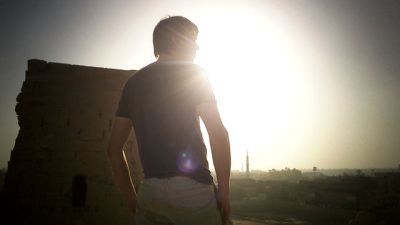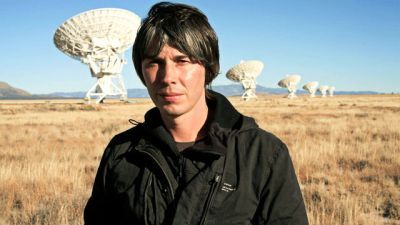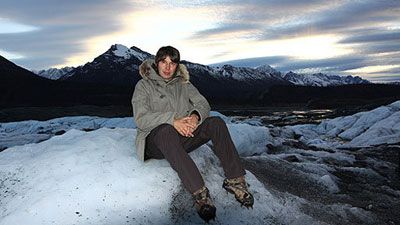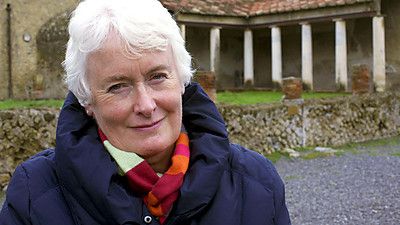The BEST episodes directed by Chris Holt

#1 - Messengers
Wonders of the Universe - Season 1 - Episode 4
In the last episode of Professor Brian Cox's epic journey across the universe, he travels from the fossils of the Burgess Shale to the sands of the oldest desert in the world to show how light holds the key to our understanding of the whole universe, including our own deepest origins. To understand how light holds the key to the story of the universe, you first have to understand its peculiar properties. Brian considers how the properties of light that lend colour to desert sands and the spectrum of a rainbow can lead to profound insights into the history and evolution of our universe. Finally, with some of the world's most fascinating fossils in hand, Brian considers how but for an apparently obscure moment in the early evolutionary history of life, all the secrets of light may have remained hidden. Because although the universe is bathed in light that carries extraordinary amounts of information about where we come from, it would have remained invisible without a crucial evolutionary development that allowed us to see. Only because of that development can we now observe, capture and contemplate the incredible wonders of the universe that we inhabit.
Watch Now:Amazon
#2 - Falling
Wonders of the Universe - Season 1 - Episode 3
In the third episode, Professor Brian Cox takes on the story of the force that sculpts the entire universe - gravity. Gravity seems so familiar, and yet it is one of the strangest and most surprising forces in the universe. Starting with a zero gravity flight, Brian experiences the feeling of total weightlessness, and considers how much of an effect gravity has had on the world around us. But gravity also acts over much greater distances. It is the great orchestrator of the cosmos. It dictates our orbit around the sun, our relationship with the other planets in our solar system, and even the way in which our solar system orbits our galaxy. Yet the paradox of gravity is that it is actually a relatively weak force. Brian takes a face distorting trip in a centrifuge to explain how it is that gravity achieves its great power, before looking at the role it plays in one of the most extraordinary phenomena in the universe - a neutron star. Although it is just a few kilometres across, it is so dense that its gravity is 100, 000 million times as strong as on Earth. Over the centuries our quest to understand gravity has allowed us to understand some of the true wonders of the universe, and Brian reveals that it is scientists' continuing search for answers that inspires his own sense of wonder.
Watch Now:Amazon
#3 - The Thin Blue Line
Wonders of the Solar System - Season 1 - Episode 3
Brian reveals how something as flimsy as an atmosphere can create some of the most wondrous sights in the solar system. He takes a ride to the top of earth's atmosphere, and in the Namib desert, he tells how Mercury lost its atmosphere.
Watch Now:Amazon#4 - Episode 1
Witch Hunt: A Century of Murder - Season 1 - Episode 1
Suzannah Lipscomb investigates the origins of the obsession for mass witch hunts and trials that swept the British Isles during the 17th century. Travelling to Scotland and Denmark, she challenges the accepted wisdom that King James VI of Scotland, later James I of England, was responsible for stirring up the hysteria. She also tells the story of Scotland's first mass witch trial in 1590 and the infamous Pendle witch trials towards the end of his reign.
Watch Now:Amazon#5 - Episode 2
Witch Hunt: A Century of Murder - Season 1 - Episode 2
Suzannah Lipscomb's investigation into the notorious 17th-century witch trials concludes with a profile of Matthew Hopkins, the opportunistic puritan witch-hunter who transformed paranoia about Satanism into a lucrative business as he hanged hundreds of people for crimes they could not possibly have committed. Making use of contemporary reports, Suzannah paints a portrait of a man who believed he could cross any boundary and break any law to achieve his goals. Naming himself `Witchfinder General', Hopkins toured the country charging fees for his services, but Suzannah's research reveals that ultimately, the public's distaste for witches was not as strong as its hatred of being conned by charlatans. Hopkins would eventually die of tuberculosis in relative obscurity, but his malign legacy lived on across the Atlantic, as witch-hunts began in Salem, Massachusetts.
Watch Now:Amazon
#6 - Pompeii: The Mystery of the People Frozen in Time
BBC Documentaries - Season 2013 - Episode 52
In a one off landmark drama documentary for BBC One, Dr Margaret Mountford presents Pompeii: The Mystery Of The People Frozen In Time. The city of Pompeii uniquely captures the public's imagination; in 79AD a legendary volcanic disaster left its citizens preserved in ashes to this very day. Yet no-one has been able to unravel the full story that is at the heart of our fascination: how did those bodies become frozen in time? For the first time the BBC has been granted unique access to these strange, ghost-like body casts that populate the ruins and, using the latest forensic technology, the chance to peer beneath the surface of the plaster in order to rebuild the faces of two of the people who were killed in this terrible tragedy. Margaret turns detective to tell a new story at the heart of one of history's most iconic moments; she looks at the unique set of circumstances that led to the remarkable preservation of the people of Pompeii. By applying modern day forensic analysis to this age-old mystery, Margaret dispels the myths surrounding the events in 79AD. She also explores the lives of the individuals who once lived in this vibrant and enigmatic city, as well as recreating the last moments of the people caught up in this tragedy.